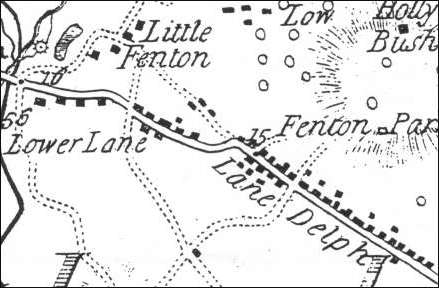|
Lower Lane, Fenton,
Stoke-on-Trent, Staffordshire.
|
Where is Lower Lane?
On the road from Longton to
Stoke the 1775 Yates map [ ]
shows that we pass through the distinct populated areas of Lane End ]
shows that we pass through the distinct populated areas of Lane End
 | The Foley | The Foley
 |
Lane Delph |
Lane Delph
 | and then we arrive
at Lower Lane. | and then we arrive
at Lower Lane.
Lower Lane was
an area of Fenton which lay
along the Newcastle-Uttoxeter road (now City Road) as it passed from
Longton through to Stoke.
In 1775 Lower
Lane and Lane
Delph were among the most populated parts of the
area.

Extract from William Yates
1775 Map of Staffordshire
- showing the Lower Lane area of Fenton
- click map for larger
area of map -
Lower Lane lay on the boundary of Little and
Great Fenton (see
 ) It covers the area at the
junction of the road now known as City Road (previously High Street West and
east) and a track which is the current Glebedale Road. ) It covers the area at the
junction of the road now known as City Road (previously High Street West and
east) and a track which is the current Glebedale Road.
[note Victoria Road was not built until about 1843]

Lower Lane - on the
boundary of Great and Little Fenton
- click map for details of Fenton Culvert and
Fenton Vivian -
The
Lower Lane area:

Lower Lane area on a
2007 map
|
The
Bakers - the
family who single-handedly 'built' Fenton:
Every building of note in the Lower Lane area of Fenton was built or
influenced by the Baker family.......
Their involvement in the area came through the acquisition of land
and a potworks.........
In 1765 William
Baker an architect from Audlem in Staffordshire, bought the estate and
manor of Fenton Culvert together with a pottery factory for his second
son William Baker II.
William Baker II came to Fenton and in
1767 he married Sarah Bagnall the daughter of Thomas Bagnall who was
Lord of the Manor of Hanley.
William and Sarah had one son, William
Baker III (to add to the confusion!!).
William III was born in 1771, his
father William II died in 1784, when his son was only 13, and nine years
later
Sarah married again. She married Ralph
Bourne, another pottery manufacturer of Fenton. In due course Ralph
Bourne took
his stepson (William III) into partnership
and the firm traded as Bourne and Baker. Ralph later took in his
brother
John Bourne
as
partner and the firm was then known as
Bourne, Baker and Bourne, earthenware
manufacturers,
Fenton.


next: the Bourne & Baker
potworks on City Road |
![]()